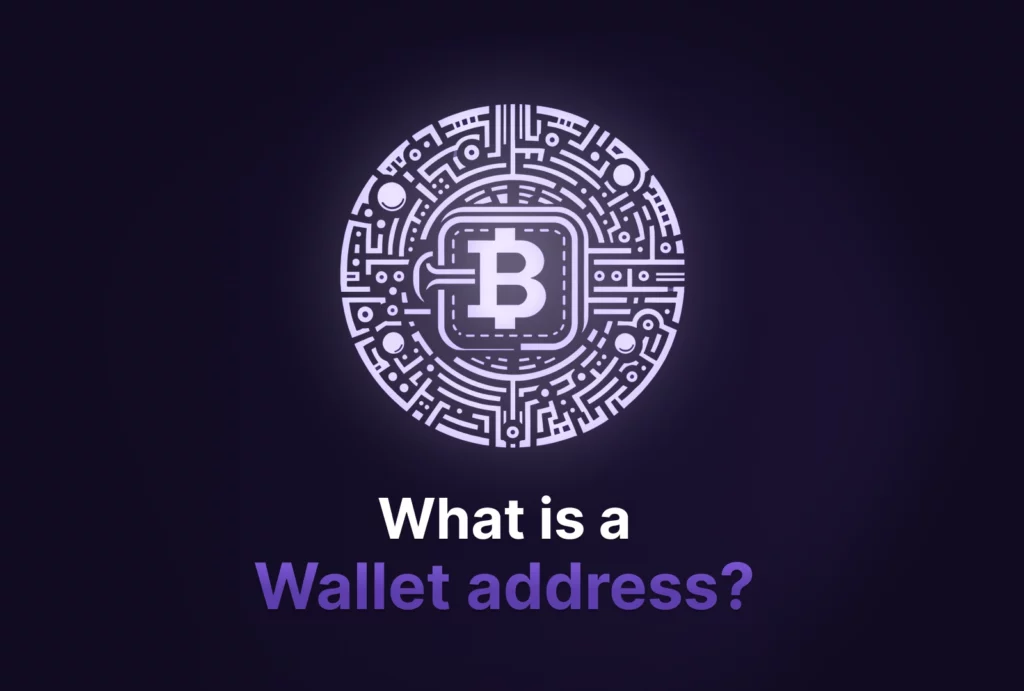What is a wallet address ?
- February 9th, 2024


If you want to exchange or mine cryptocurrencies, you’ll definitely need a wallet address. And that’s when some of you might be wondering “What is a wallet address ?”. Indeed, this question raises a fundamental concept for anyone involved in digital transactions. Recently, Bitwise made headlines as the first spot Bitcoin ETF provider to openly share its wallet address, marking a significant step towards transparency in the crypto industry.
Table of content
- Understanding Crypto Wallets: The Gateway to Digital Assets
- When it comes to crypto wallets, what is a wallet address ?
- How does a wallet address work?
- The Role of Wallet Addresses in Crypto Investment
- The Impact of Wallet Addresses on Crypto Security
- Wallet Addresses and the Future of Cryptocurrency Transactions
- Frequently Asked Questions
- Conclusion
Understanding Crypto Wallets: The Gateway to Digital Assets
Before answering the question “What is a wallet address ?”, it’s crucial to grasp the concept of a crypto wallet. Think of a crypto wallet not as a physical wallet that holds your coins, but rather as a digital gateway to your cryptocurrency holdings. It’s a software program that stores private and public keys, interacts with various blockchains to enable users to send and receive digital currency, and monitors their balance.
Crypto wallets operate on the principle of digital signatures, which facilitate secure transactions on the blockchain. When you create a wallet, you’re essentially generating a cryptographic pair of keys. The private key is your guarded secret, akin to the PIN for your bank account, which you must never share as explained by Blocktrade. It’s what allows you to access and control your funds. The public key, derived from the private key, is shared openly and acts as your address on the blockchain where others can send you crypto.
When it comes to crypto wallets, what is a wallet address ?
A wallet address emerges from the public key using cryptographic algorithms, creating a shorter, more manageable string of characters. This address is what you share with others to receive funds. Each time you initiate a transaction, the wallet software uses your private key to sign it, proving to the network that you are the rightful owner of the funds being sent. The transaction is then broadcast to the blockchain, where it’s verified by miners and added to a block. Despite the complexity behind the scenes, the user experience is streamlined: you simply send or receive digital assets using wallet addresses, with the underlying technology ensuring everything runs smoothly.
How does a wallet address work?
When initiating a transfer, the sender is required to input the recipient’s wallet address into their wallet application. This can be done either by manually entering the address, which is a long string of alphanumeric characters, or by scanning a QR code provided by the recipient, simplifying the process and reducing the chance of errors.
Cryptocurrency networks have distinct conventions for generating wallet addresses. For instance:
- Bitcoin addresses typically start with “1”, “3”, or “bc1”, each denoting different address formats like Legacy, SegWit, or Bech32.
- Ethereum addresses always begin with “0x”, reflecting their hexadecimal encoding.
- Litecoin, Bitcoin Cash, and Dogecoin have their unique identifiers, such as “L” or “M” for Litecoin, and “q” or “p” for Bitcoin Cash addresses, demonstrating the diverse ecosystem of digital currencies.
These conventions not only help in identifying the cryptocurrency network of the address but also play a role in ensuring transactions are processed correctly within their respective blockchains. The design and structure of wallet addresses are inherently public, allowing anyone to view transaction histories and balances associated with them, though without revealing the identity of the wallet’s owner. This public nature ensures transparency in the blockchain network, yet underscores the importance of privacy measures and careful sharing of wallet addresses.


The Role of Wallet Addresses in Crypto Investment
For crypto miners and investors, understanding and utilizing wallet addresses is fundamental. They not only enable the receipt of mined coins but also serve as a gateway to participating in the broader crypto economy, from trading on exchanges to investing in ICOs and holding assets in secure wallets. Wondering what is a wallet address ? It is a part of your digital identity. This is why choosing the right crypto wallet is crucial for managing your activities effectively. For those looking to navigate the myriad options available, our comprehensive guide on choosing the right crypto wallet offers insights into selecting a wallet that best suits your mining and investment needs. This resource is particularly useful for miners and investors participating in our mining pool service, ensuring that you make informed decisions about where to store your digital assets securely.
The Impact of Wallet Addresses on Crypto Security
Security is paramount in the world of digital finance, and wallet addresses play a critical role in safeguarding users’ assets. By allowing for transactions without revealing the parties’ identities, they offer a layer of anonymity that is much appreciated in the crypto community.
Moreover, advancements such as hardware wallets and multi-signature addresses have substantially strengthened the security infrastructure surrounding digital assets. Hardware wallets, for instance, provide a physical layer of security by storing private keys in a device isolated from internet vulnerabilities, thus mitigating risks associated with online thefts and hacking. These devices are designed to be waterproof, tamperproof, and fireproof, enhancing the durability and security of your crypto assets.
Multi-signature addresses add another layer of security by requiring more than one signature to authorize a transaction. This feature significantly decreases the risk of unauthorized access because it necessitates the approval of multiple parties before funds can be moved, thus providing a collective security measure that protects against the loss or theft of private keys.
In summary, the integration of hardware wallets and multi-signature addresses further bolsters the resilience of digital currencies against a broad spectrum of security threats. As the crypto space continues to evolve, adopting robust security measures will remain paramount for users and exchanges alike to protect their digital assets. If you were wondering “What is a wallet address ?” You should now know that it’s an important component of your online security.
Wallet Addresses and the Future of Cryptocurrency Transactions
The future of cryptocurrency transactions is poised for significant advancements that promise to enhance both accessibility and security. Innovations such as human-readable wallet addresses are making strides in simplifying the user experience. For instance, the FIO Protocol allows users to send, receive, and request crypto payments using easily memorable addresses like “username@domain”, eliminating the need to manage long and complex public keys. This innovation is not only expected to reduce errors and lost funds but also to foster wider adoption by making crypto transactions as straightforward as using an email address.
Additionally, AI’s role in detecting fraudulent activities, analyzing transaction patterns, and identifying suspicious behaviors parallels the function of wallet addresses as unique identifiers in securing transactions. Wallet addresses ensure that transactions reach their intended destination securely. In contrast, AI can monitor these transactions in real time to detect anomalies that may indicate fraud, enhancing the security measures provided by wallet addresses. This layer of security will be critical as the digital currency ecosystem continues to grow and attract more users. Mastercard has also recently leveraged AI in a partnership with Feedzai, a regulatory technology platform, to combat cryptocurrency fraud more effectively. This collaboration highlights how traditional financial institutions are adopting advanced AI technologies to address the unique challenges presented by the digital currency ecosystem.
Frequently Asked Questions
A wallet address is a unique alphanumeric identifier that enables the sending and receiving of cryptocurrencies between wallets. It’s derived from your public key using cryptographic algorithms, creating a manageable identifier that allows others to transfer digital assets to you without revealing personal information.
A wallet address functions as a digital location for sending and receiving cryptocurrencies. When you want to receive crypto, you share your wallet address with the sender. They input this address into their wallet application, either manually or by scanning a QR code, to transfer the funds to you securely.
Yes, it’s safe to share your wallet address for receiving funds, but never share your private key or seed phrase.
Wallet addresses are crucial for securely managing cryptocurrency transactions, enabling the receipt of mined coins, participating in the crypto economy, and holding assets securely. They serve as a digital identity in the blockchain network, facilitating safe and transparent transactions.
No, different cryptocurrencies typically require different addresses. Always ensure you’re using the correct address for the specific cryptocurrency you’re transacting with.
Conclusion
Grasping “what is a wallet address?” is fundamental in the digital finance world, serving as a crucial element for secure cryptocurrency transactions. This exploration has highlighted the pivotal role of wallet addresses, from ensuring transaction security to facilitating seamless exchanges on the blockchain. Innovations like human-readable addresses and AI for fraud detection are steering us towards a more accessible and secure cryptocurrency future. As the crypto landscape evolves, the importance of understanding wallet addresses grows, laying the groundwork for a more inclusive financial ecosystem. This knowledge not only empowers users across the spectrum but also heralds a new era of digital finance, making it an exciting time to engage with cryptocurrencies. Embracing these advancements will undoubtedly enrich our digital currency experience, heralding a more secure and user-friendly financial future.
For more analysis and support, follow Cruxpool on X, Discord and Telegram. If you want to mine efficiently using GPU or ASIC, join one of our mining pools!